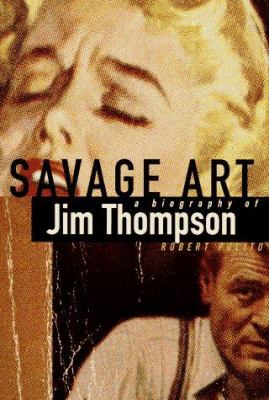
by Robert Polito
Library Journal
: Polito, who directs the writing program at New York City's New School for Social Research and who edited and wrote the introduction for the Thompson anthology Fireworks (Donald I. Fine, 1988), presents an intimate, meticulously researched portrait of the author of such classic noir novels as The Killer Inside Me, Pop 1280, and The Grifters. Polito interviewed members of Thompson's family, researched historical records, and carefully combed Thompson's own autobiographical writing to provide insight into his character and development as a writer. Thompson's readers will recognize here the wellspring of his art: his peripatetic childhood, his tormented young manhood, and his ultimately disappointing adulthood. Polito described Thompson's struggles with alcohol and his associations with an amalgamation of grifters and hobos, but he also presents fond reminiscences from people who knew Thompson as a loving brother, mentor, and friend. Thompson's life, like his book, makes wrenching reading. Recommended where biographies or crime fiction are collected. Denise Johnson, Bradley Univ. Lib., Peoria, Ill. Distributed by Syndetic Solutions Inc. Terms
Publishers Weekly
: A series of Vintage reprints and Hollywood films like The Getaway and The Grifters have helped develop a wider popular and critical following for crime author Jim Thompson (1906-1977) than he sustained while alive. More twisted, sadistic and nihilistic than Chandler or Caine, Thompson's trademarks were his fiendish first-person psychopaths and lowlifes and his grim tales of failed lives and thwarted crimes. Polito, director of the writing program at Manhattan's New School, here untangles the man from his two-volume autobiography (Bad Boy and Roughneck), revealing a maverick alcoholic who was dogged by spells of depression and missed opportunities throughout his hand-to-mouth career. The son of a corrupt Oklahoma sheriff who lost his money speculating in oil, Thompson had his first alcohol-induced nervous breakdown as a hotel busboy in Ft. Worth while still in high school. He oscillated between low-wage jobs, hack journalism and literary circles for the rest of his life; joined the Communist Party in 1936; briefly became director of the Oklahoma Writer's Project; and struggled to publish novels that were often either too dark or slapdash for the mainstream. He enjoyed his most prolific period under editor Arnold Halo at Lion Books in the 1950s, eventually landing in Hollywood as a part-time film and television writer. This meticulous study adroitly evokes the rise of pulp adventure and crime magazines like Saga and True Detective, where Thompson honed his style, and the seedy underworld of hoboes and grifters who formed the models for his ``savage art.'' Photos. Copyright 1995 Cahners Business Information, Inc. Distributed by Syndetic Solutions Inc. Terms
|